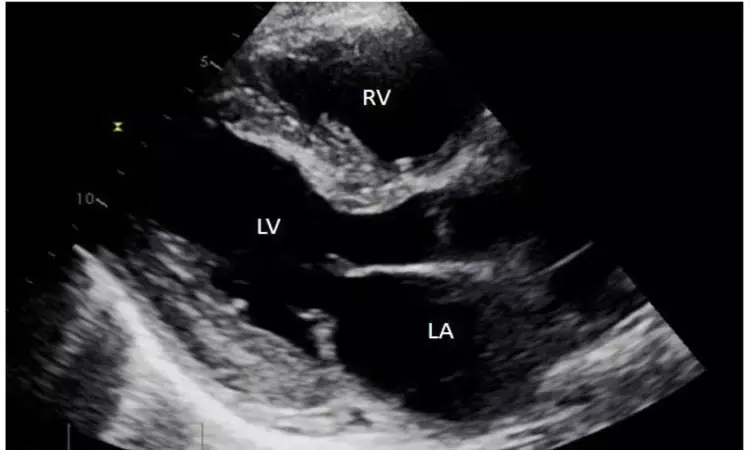- Home
- Medical news & Guidelines
- Anesthesiology
- Cardiology and CTVS
- Critical Care
- Dentistry
- Dermatology
- Diabetes and Endocrinology
- ENT
- Gastroenterology
- Medicine
- Nephrology
- Neurology
- Obstretics-Gynaecology
- Oncology
- Ophthalmology
- Orthopaedics
- Pediatrics-Neonatology
- Psychiatry
- Pulmonology
- Radiology
- Surgery
- Urology
- Laboratory Medicine
- Diet
- Nursing
- Paramedical
- Physiotherapy
- Health news
- Fact Check
- Bone Health Fact Check
- Brain Health Fact Check
- Cancer Related Fact Check
- Child Care Fact Check
- Dental and oral health fact check
- Diabetes and metabolic health fact check
- Diet and Nutrition Fact Check
- Eye and ENT Care Fact Check
- Fitness fact check
- Gut health fact check
- Heart health fact check
- Kidney health fact check
- Medical education fact check
- Men's health fact check
- Respiratory fact check
- Skin and hair care fact check
- Vaccine and Immunization fact check
- Women's health fact check
- AYUSH
- State News
- Andaman and Nicobar Islands
- Andhra Pradesh
- Arunachal Pradesh
- Assam
- Bihar
- Chandigarh
- Chattisgarh
- Dadra and Nagar Haveli
- Daman and Diu
- Delhi
- Goa
- Gujarat
- Haryana
- Himachal Pradesh
- Jammu & Kashmir
- Jharkhand
- Karnataka
- Kerala
- Ladakh
- Lakshadweep
- Madhya Pradesh
- Maharashtra
- Manipur
- Meghalaya
- Mizoram
- Nagaland
- Odisha
- Puducherry
- Punjab
- Rajasthan
- Sikkim
- Tamil Nadu
- Telangana
- Tripura
- Uttar Pradesh
- Uttrakhand
- West Bengal
- Medical Education
- Industry
Levosimendan may improve right ventricular function in patients undergoing mitral valve surgery

In patients having cardiac surgery, right ventricular dysfunction (RV dysfunction) is now generally recognized as an independent predictor of death. It is well accepted that individuals with aberrant RV contractility or morphology are at increased perioperative risk for cardiac valve surgery because the level of preoperative RV dysfunction impacts both immediate and long-term outcomes. The use of inotropes in the postoperative treatment of RV dysfunction is widely established. RV hemodynamics have improved with the use of beta-adrenergic agonists like Dobutamine and phosphodiesterase inhibitors like Milrinone. The myocardium that is hibernating but still alive is damaged as a consequence of cardiac ischemia caused by these inotropes, which also increase the risk of arrhythmias. Levosimendan is a novel family of medication known as myofilament calcium sensitizers and is a positive inotrope and vasodilator. A recent research found that levosimendan is a potential treatment option for individuals with RV dysfunction having MV surgery.
At a tertiary care facility, a prospective randomized double-blinded controlled trial was carried out. Sixty adult patients, aged 15 to 65, who were scheduled for elective MV surgery and had preoperative transthoracic echocardiography (TTE) findings of RV dysfunction, were randomly assigned to the levosimendan (L) group or the placebo (P) group. Levosimendan was given to patients in the L group at a rate of 0.1 mcg/kg/min after induction for 24 hours, whereas multivitamin infusion was given to patients in the P group at the same rate. Standard inotropic treatment was administered to both groups. At 6 hours, 24 hours, and 7 days after surgery, the hemodynamic and echocardiographic RV function parameters (RV size, Inferior vena cava (IVC) diameter, RV fractional area change (RVFAC), Tricuspid annular plane systolic excursion (TAPSE), and Systolic Pulmonary Artery Pressure (SPAP)) were compared between the groups. Both groups saw improvements from baseline to 24 hours in all hemodynamic and echocardiographic indicators of RV function, including RV size, IVC diameter, RVFAC, TAPSE, and SPAP. At 24 hours and 7 days postoperatively, levosimendan significantly improved RV function compared to the P group.
A triple-action drug called levosimendan that simultaneously has inotropic, vasodilatory, and anti-ischemic properties is now available to help treat the complicated cardiovascular condition known as RV dysfunction associated with valvular heart disorders. This beneficial impact is not connected to a rise in myocardial oxygen demand or a reduction in myocardial relaxation when compared to other inotropic drugs. Levosimendan has been found to enhance ventriculoarterial coupling in animal models of right ventricular failure by combining PVR lowering and increasing RV contractility. Levosimendan may be beneficial in patients with RV dysfunction who are undergoing Mitral valve replacement or repair surgery, the current research strongly shows. The research showed that a 24-hour infusion of levosimendan dramatically improved RV function in patients with RV dysfunction following MV procedures, as seen by both hemodynamic and 2D echocardiographic measures. Up to the seventh PO day, this improvement in the RV function was seen.
Reference –
Bharathi K S, Pruthi G, Dhananjaya M, Simha PP. The effect of levosimendan on the right ventricular function in patients with right ventricular dysfunction undergoing mitral valve surgery. Ann Card Anaesth 2023;26:50-6.
MBBS, MD (Anaesthesiology), FNB (Cardiac Anaesthesiology)
Dr Monish Raut is a practicing Cardiac Anesthesiologist. He completed his MBBS at Government Medical College, Nagpur, and pursued his MD in Anesthesiology at BJ Medical College, Pune. Further specializing in Cardiac Anesthesiology, Dr Raut earned his FNB in Cardiac Anesthesiology from Sir Ganga Ram Hospital, Delhi.
Dr Kamal Kant Kohli-MBBS, DTCD- a chest specialist with more than 30 years of practice and a flair for writing clinical articles, Dr Kamal Kant Kohli joined Medical Dialogues as a Chief Editor of Medical News. Besides writing articles, as an editor, he proofreads and verifies all the medical content published on Medical Dialogues including those coming from journals, studies,medical conferences,guidelines etc. Email: drkohli@medicaldialogues.in. Contact no. 011-43720751


